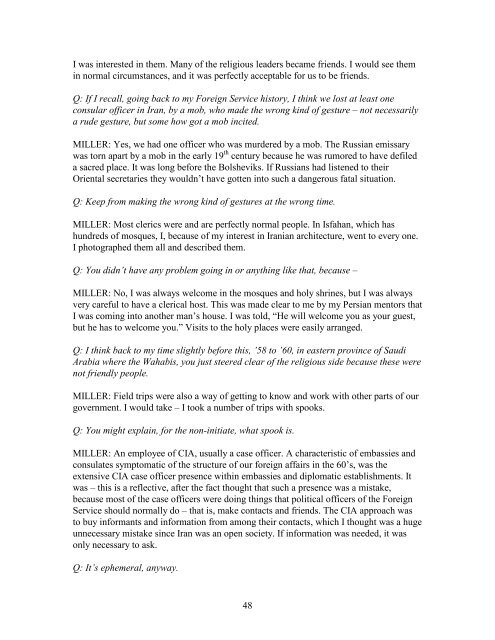1 The Association for Diplomatic Studies and Training Foreign ...
1 The Association for Diplomatic Studies and Training Foreign ...
1 The Association for Diplomatic Studies and Training Foreign ...
Create successful ePaper yourself
Turn your PDF publications into a flip-book with our unique Google optimized e-Paper software.
I was interested in them. Many of the religious leaders became friends. I would see them<br />
in normal circumstances, <strong>and</strong> it was perfectly acceptable <strong>for</strong> us to be friends.<br />
Q: If I recall, going back to my <strong>Foreign</strong> Service history, I think we lost at least one<br />
consular officer in Iran, by a mob, who made the wrong kind of gesture – not necessarily<br />
a rude gesture, but some how got a mob incited.<br />
MILLER: Yes, we had one officer who was murdered by a mob. <strong>The</strong> Russian emissary<br />
was torn apart by a mob in the early 19 th century because he was rumored to have defiled<br />
a sacred place. It was long be<strong>for</strong>e the Bolsheviks. If Russians had listened to their<br />
Oriental secretaries they wouldn’t have gotten into such a dangerous fatal situation.<br />
Q: Keep from making the wrong kind of gestures at the wrong time.<br />
MILLER: Most clerics were <strong>and</strong> are perfectly normal people. In Isfahan, which has<br />
hundreds of mosques, I, because of my interest in Iranian architecture, went to every one.<br />
I photographed them all <strong>and</strong> described them.<br />
Q: You didn’t have any problem going in or anything like that, because –<br />
MILLER: No, I was always welcome in the mosques <strong>and</strong> holy shrines, but I was always<br />
very careful to have a clerical host. This was made clear to me by my Persian mentors that<br />
I was coming into another man’s house. I was told, “He will welcome you as your guest,<br />
but he has to welcome you.” Visits to the holy places were easily arranged.<br />
Q: I think back to my time slightly be<strong>for</strong>e this, ’58 to ’60, in eastern province of Saudi<br />
Arabia where the Wahabis, you just steered clear of the religious side because these were<br />
not friendly people.<br />
MILLER: Field trips were also a way of getting to know <strong>and</strong> work with other parts of our<br />
government. I would take – I took a number of trips with spooks.<br />
Q: You might explain, <strong>for</strong> the non-initiate, what spook is.<br />
MILLER: An employee of CIA, usually a case officer. A characteristic of embassies <strong>and</strong><br />
consulates symptomatic of the structure of our <strong>for</strong>eign affairs in the 60’s, was the<br />
extensive CIA case officer presence within embassies <strong>and</strong> diplomatic establishments. It<br />
was – this is a reflective, after the fact thought that such a presence was a mistake,<br />
because most of the case officers were doing things that political officers of the <strong>Foreign</strong><br />
Service should normally do – that is, make contacts <strong>and</strong> friends. <strong>The</strong> CIA approach was<br />
to buy in<strong>for</strong>mants <strong>and</strong> in<strong>for</strong>mation from among their contacts, which I thought was a huge<br />
unnecessary mistake since Iran was an open society. If in<strong>for</strong>mation was needed, it was<br />
only necessary to ask.<br />
Q: It’s ephemeral, anyway.<br />
48
















